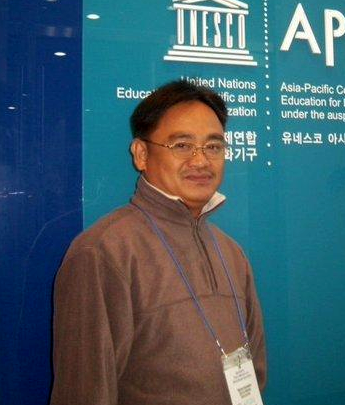404
Sorry - Page Not Found!
The page you are looking for was moved, removed, renamed
or might never existed. You stumbled upon a broken link :


Background and Rationale:
The dawn of the 21th century is aptly described as reign of knowledge era or
information age. The social transformation and challenges brought about by
this changes Is unpredictable and immeasurable. A paradigm shift is a response
commonly echoed by social tranformistionist. As global competitiveness
becoming steep, those who have knowledge is in control and empowered. A
functional knowledge and right information necessitates in empowering
societies and communities that would mold and shape the shared vision and
democratization to prosper. Anchored on the concept of parallel and shared
leadership, any desired social change must be tuned to shared responsibility
and commitment. Envisaged of the current initiative in resolving the violent
conflict Mindanao, the peace agenda have to be repositioned, rethink and
reengineered in the light of the global phenomenon and local realities on the
ground. The argument described in the proponents’ paper read in IPRA Calgary
Conference in 2006 proven later when renewed hostilities ensued in 2008
between MILF and AFP that led to the impasse of the peace negotiation. The
controversial Memorandum of Agreement was nullified by the Supreme Court upon
the petition leading Mindanao Leader s like (Gov. Pinol and Mayor Lobregat).
Thus proves that the aborted MOA was not shared, more or less, not widely
explained and disseminated to various stakeholders and players in the Mindanao
Conflict. The social distance component of the Mindanao Problem seems
neglected. The perceptual root of conflict was not properly addressed as shown
in the Christians public outcry and media hype on the aborted MO-AD.
Aggravated by the spate of bombings in the various cities in Mindanao from
2001-2007, the barbaric activities of the Abusayyaf group , human rights
violation continuously perpetrated by government forces against Muslims, the
national political crisis, the 9-11 fiasco and global war on terror, the
impact to social distance relation of various ethno-religious groups which
have a long history of schism and animosity could have been aggravated
further. Thus calls for an evaluation of social distance study in order to
evaluate its impact and be able to propose some innovation for its resolution
to be part of the International contact group.
OBJECTIVES:
1. Evaluate the state of Social Distance between and among communities in
selected conflict areas.
a. To solicit grassroots perspective in addressing stereotype and cultural
gaps in bridging ethno –religious culture.
b. To determine fanatical movements, personalities and religious teaching that
breeds social tensions and schism.
c. To solicit grassroots agenda in containing religious extremism and
terroristic related activities.
2. To review and evaluate the public perception on the activities of
International Monitoring team (IMT) as an input to the International Contact
Group (ICG).
a. To solicit community based perception and expectation from the
international Contact Group.
b. To promote acceptability of ICG and provide community based assistance to
enhance peace facilitation.
3. To form e-Peace Guards in facilitating confidence building measures towards
a sustained peace agenda.
a. To promote the peace agreements between GRP-MILF as a shared vision for
peace in Mindanao.
b. To disseminate peace information and create an e-peace community in
strengthening the technical skills in Information technology thru dispersal of
computer and facilitate wireless internet access in selected conflict affected
areas.
4. To gather themes and activities in bridging social relation by
institutionalizing social harmony day to address the psycho-social component
of peace agenda.
5. To optimize the role of ICG in Peace building to include in bridging
awareness for social distance and religious tolerance and mutual respect in
the spirit of multiculturalism.
6. To explore avenues towards IPRA engagement in the International Contact
Group in line with IPRA Mission.
Project Beneficiaries:
Priority young generation age bracket 18-30 in conflict areas.